ABC Learning Case Study: Unethical Practices and Financial Reporting
VerifiedAdded on 2023/06/04
|8
|1975
|268
Case Study
AI Summary
This case study delves into the collapse of ABC Learning, an Australian childcare provider, highlighting the factors contributing to its downfall. Initially successful, ABC Learning experienced rapid growth followed by a swift decline due to accounting discrepancies, inadequate corporate governance, and the global financial crisis. The company's manipulative accounting practices, aimed at concealing its deteriorating financial position, included inflating profits and engaging in related-party transactions with insufficient disclosures. The board's lack of relevant expertise and the auditor's negligence in identifying and addressing accounting irregularities further exacerbated the situation. The collapse resulted in significant losses for employees, financial institutions, and shareholders, underscoring the importance of ethical conduct, transparent financial reporting, and robust corporate governance in maintaining stakeholder trust and ensuring long-term sustainability.
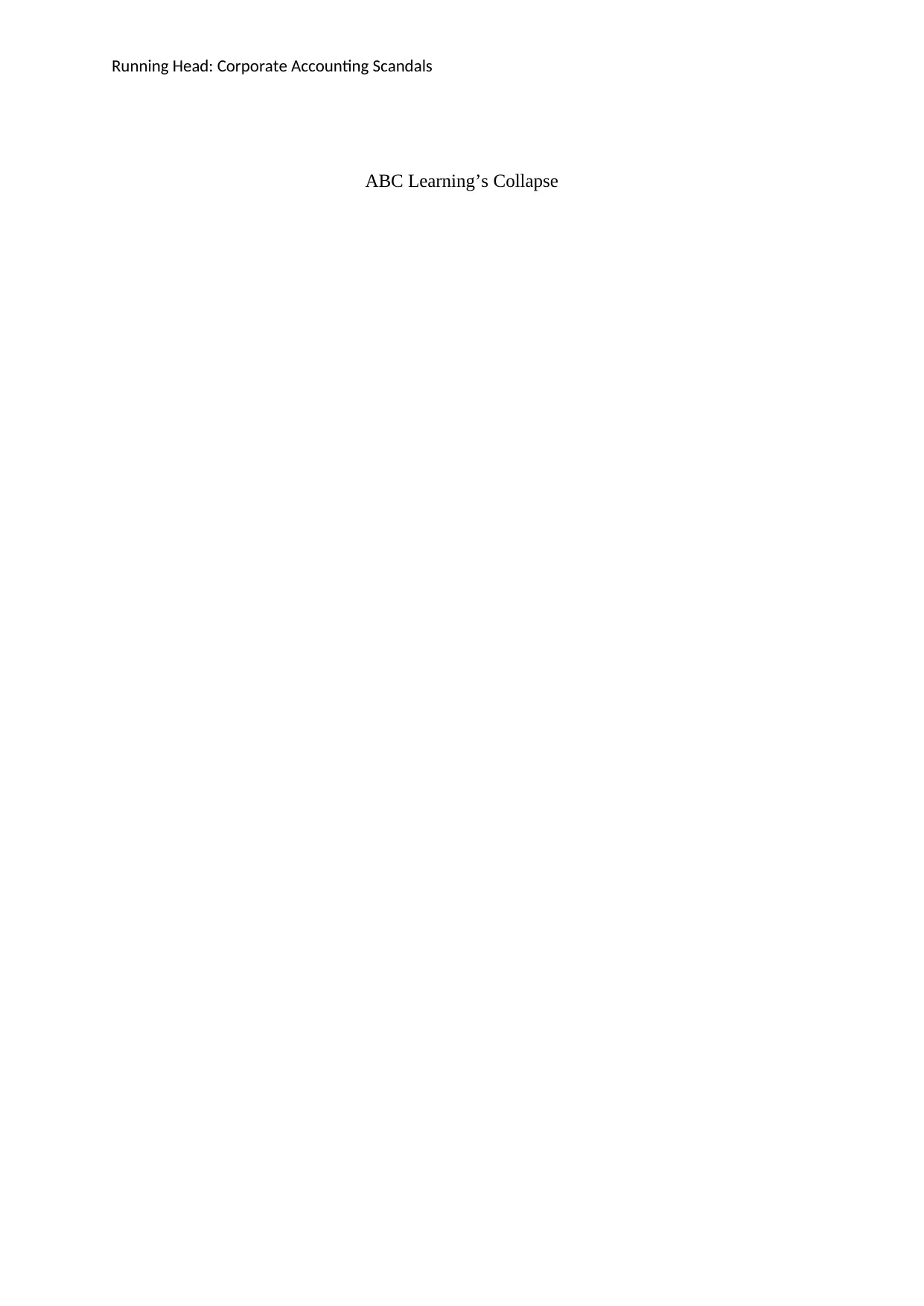
Running Head: Corporate Accounting Scandals
ABC Learning’s Collapse
ABC Learning’s Collapse
Paraphrase This Document
Need a fresh take? Get an instant paraphrase of this document with our AI Paraphraser
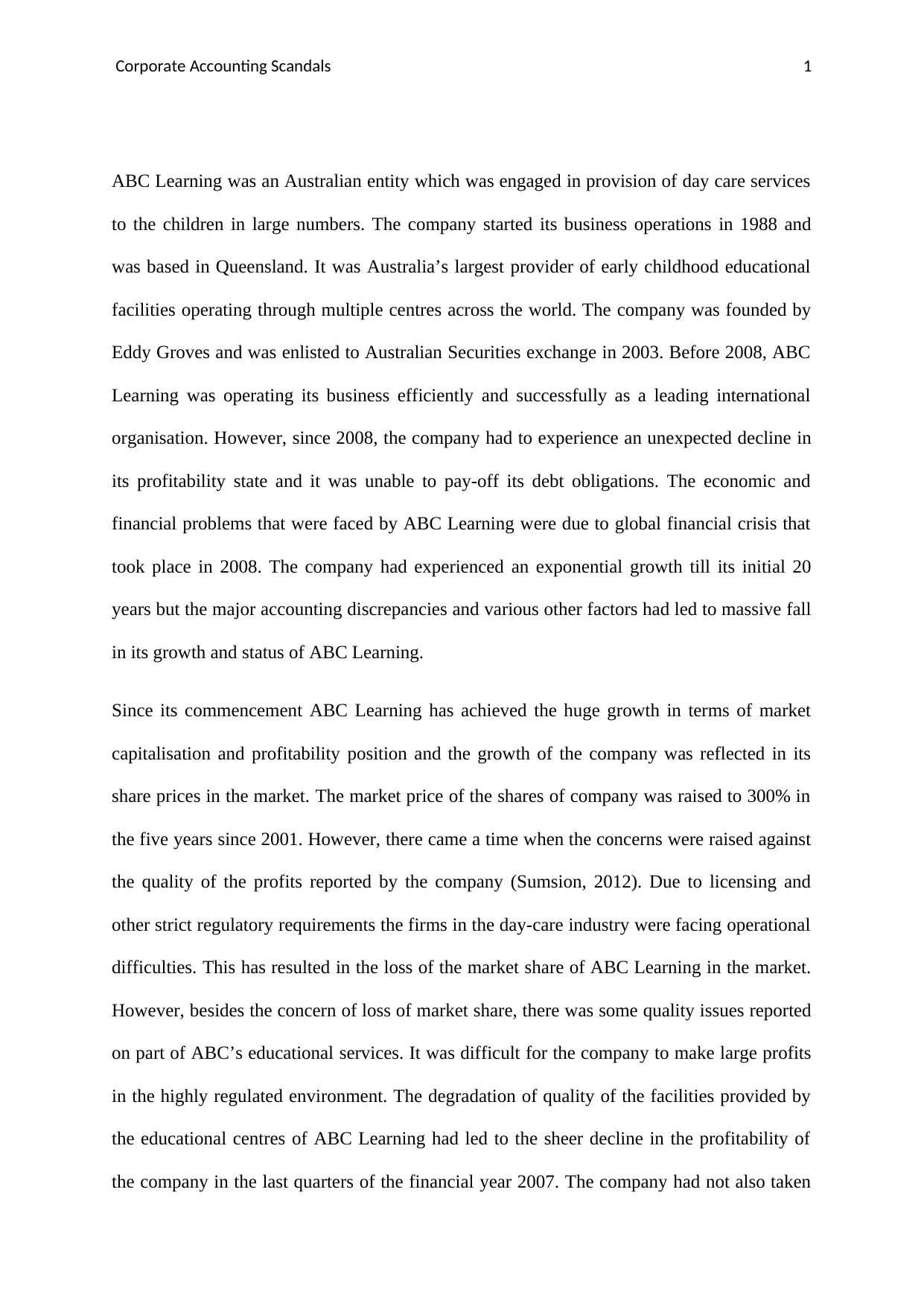
Corporate Accounting Scandals 1
ABC Learning was an Australian entity which was engaged in provision of day care services
to the children in large numbers. The company started its business operations in 1988 and
was based in Queensland. It was Australia’s largest provider of early childhood educational
facilities operating through multiple centres across the world. The company was founded by
Eddy Groves and was enlisted to Australian Securities exchange in 2003. Before 2008, ABC
Learning was operating its business efficiently and successfully as a leading international
organisation. However, since 2008, the company had to experience an unexpected decline in
its profitability state and it was unable to pay-off its debt obligations. The economic and
financial problems that were faced by ABC Learning were due to global financial crisis that
took place in 2008. The company had experienced an exponential growth till its initial 20
years but the major accounting discrepancies and various other factors had led to massive fall
in its growth and status of ABC Learning.
Since its commencement ABC Learning has achieved the huge growth in terms of market
capitalisation and profitability position and the growth of the company was reflected in its
share prices in the market. The market price of the shares of company was raised to 300% in
the five years since 2001. However, there came a time when the concerns were raised against
the quality of the profits reported by the company (Sumsion, 2012). Due to licensing and
other strict regulatory requirements the firms in the day-care industry were facing operational
difficulties. This has resulted in the loss of the market share of ABC Learning in the market.
However, besides the concern of loss of market share, there was some quality issues reported
on part of ABC’s educational services. It was difficult for the company to make large profits
in the highly regulated environment. The degradation of quality of the facilities provided by
the educational centres of ABC Learning had led to the sheer decline in the profitability of
the company in the last quarters of the financial year 2007. The company had not also taken
ABC Learning was an Australian entity which was engaged in provision of day care services
to the children in large numbers. The company started its business operations in 1988 and
was based in Queensland. It was Australia’s largest provider of early childhood educational
facilities operating through multiple centres across the world. The company was founded by
Eddy Groves and was enlisted to Australian Securities exchange in 2003. Before 2008, ABC
Learning was operating its business efficiently and successfully as a leading international
organisation. However, since 2008, the company had to experience an unexpected decline in
its profitability state and it was unable to pay-off its debt obligations. The economic and
financial problems that were faced by ABC Learning were due to global financial crisis that
took place in 2008. The company had experienced an exponential growth till its initial 20
years but the major accounting discrepancies and various other factors had led to massive fall
in its growth and status of ABC Learning.
Since its commencement ABC Learning has achieved the huge growth in terms of market
capitalisation and profitability position and the growth of the company was reflected in its
share prices in the market. The market price of the shares of company was raised to 300% in
the five years since 2001. However, there came a time when the concerns were raised against
the quality of the profits reported by the company (Sumsion, 2012). Due to licensing and
other strict regulatory requirements the firms in the day-care industry were facing operational
difficulties. This has resulted in the loss of the market share of ABC Learning in the market.
However, besides the concern of loss of market share, there was some quality issues reported
on part of ABC’s educational services. It was difficult for the company to make large profits
in the highly regulated environment. The degradation of quality of the facilities provided by
the educational centres of ABC Learning had led to the sheer decline in the profitability of
the company in the last quarters of the financial year 2007. The company had not also taken
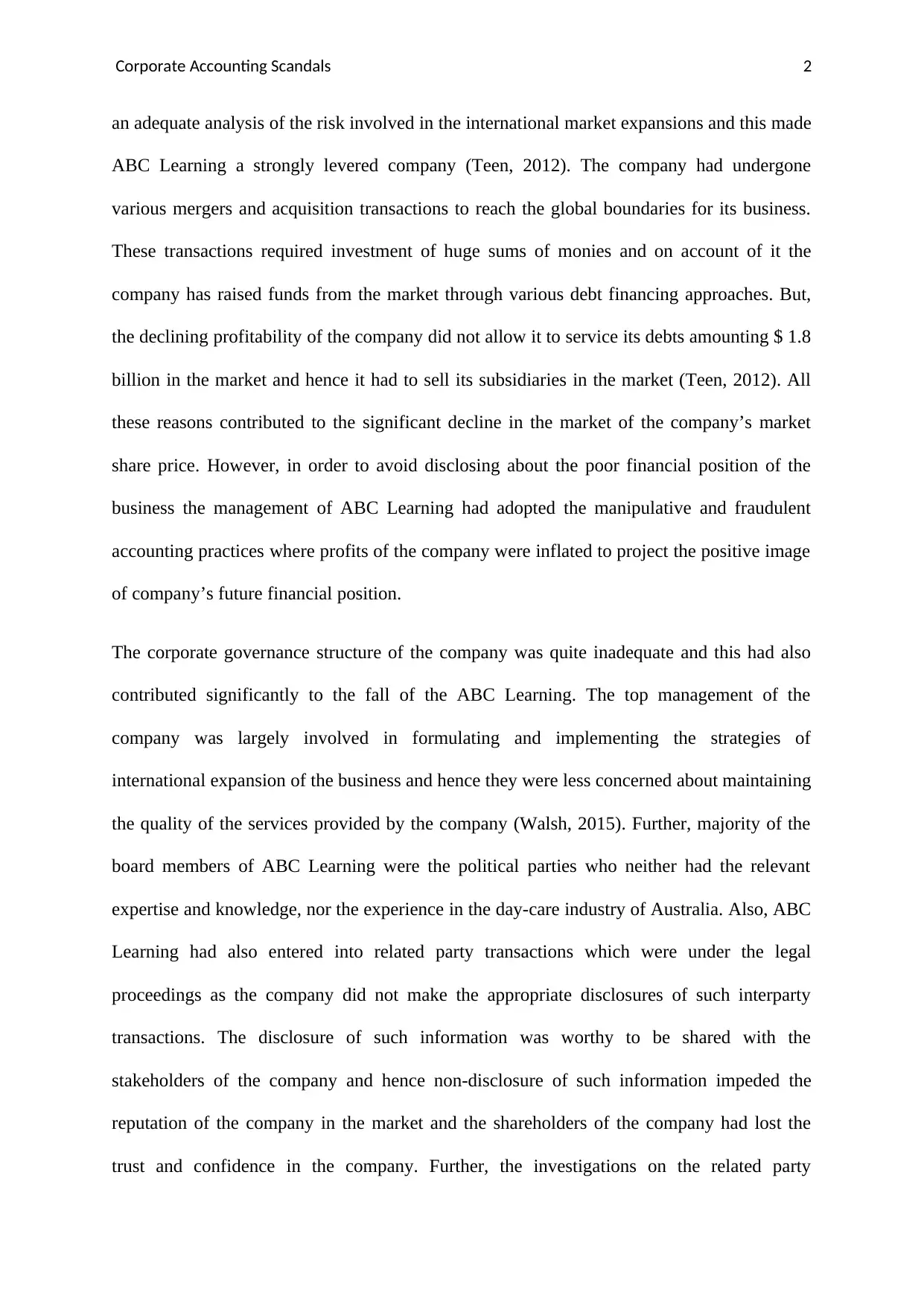
Corporate Accounting Scandals 2
an adequate analysis of the risk involved in the international market expansions and this made
ABC Learning a strongly levered company (Teen, 2012). The company had undergone
various mergers and acquisition transactions to reach the global boundaries for its business.
These transactions required investment of huge sums of monies and on account of it the
company has raised funds from the market through various debt financing approaches. But,
the declining profitability of the company did not allow it to service its debts amounting $ 1.8
billion in the market and hence it had to sell its subsidiaries in the market (Teen, 2012). All
these reasons contributed to the significant decline in the market of the company’s market
share price. However, in order to avoid disclosing about the poor financial position of the
business the management of ABC Learning had adopted the manipulative and fraudulent
accounting practices where profits of the company were inflated to project the positive image
of company’s future financial position.
The corporate governance structure of the company was quite inadequate and this had also
contributed significantly to the fall of the ABC Learning. The top management of the
company was largely involved in formulating and implementing the strategies of
international expansion of the business and hence they were less concerned about maintaining
the quality of the services provided by the company (Walsh, 2015). Further, majority of the
board members of ABC Learning were the political parties who neither had the relevant
expertise and knowledge, nor the experience in the day-care industry of Australia. Also, ABC
Learning had also entered into related party transactions which were under the legal
proceedings as the company did not make the appropriate disclosures of such interparty
transactions. The disclosure of such information was worthy to be shared with the
stakeholders of the company and hence non-disclosure of such information impeded the
reputation of the company in the market and the shareholders of the company had lost the
trust and confidence in the company. Further, the investigations on the related party
an adequate analysis of the risk involved in the international market expansions and this made
ABC Learning a strongly levered company (Teen, 2012). The company had undergone
various mergers and acquisition transactions to reach the global boundaries for its business.
These transactions required investment of huge sums of monies and on account of it the
company has raised funds from the market through various debt financing approaches. But,
the declining profitability of the company did not allow it to service its debts amounting $ 1.8
billion in the market and hence it had to sell its subsidiaries in the market (Teen, 2012). All
these reasons contributed to the significant decline in the market of the company’s market
share price. However, in order to avoid disclosing about the poor financial position of the
business the management of ABC Learning had adopted the manipulative and fraudulent
accounting practices where profits of the company were inflated to project the positive image
of company’s future financial position.
The corporate governance structure of the company was quite inadequate and this had also
contributed significantly to the fall of the ABC Learning. The top management of the
company was largely involved in formulating and implementing the strategies of
international expansion of the business and hence they were less concerned about maintaining
the quality of the services provided by the company (Walsh, 2015). Further, majority of the
board members of ABC Learning were the political parties who neither had the relevant
expertise and knowledge, nor the experience in the day-care industry of Australia. Also, ABC
Learning had also entered into related party transactions which were under the legal
proceedings as the company did not make the appropriate disclosures of such interparty
transactions. The disclosure of such information was worthy to be shared with the
stakeholders of the company and hence non-disclosure of such information impeded the
reputation of the company in the market and the shareholders of the company had lost the
trust and confidence in the company. Further, the investigations on the related party
⊘ This is a preview!⊘
Do you want full access?
Subscribe today to unlock all pages.

Trusted by 1+ million students worldwide
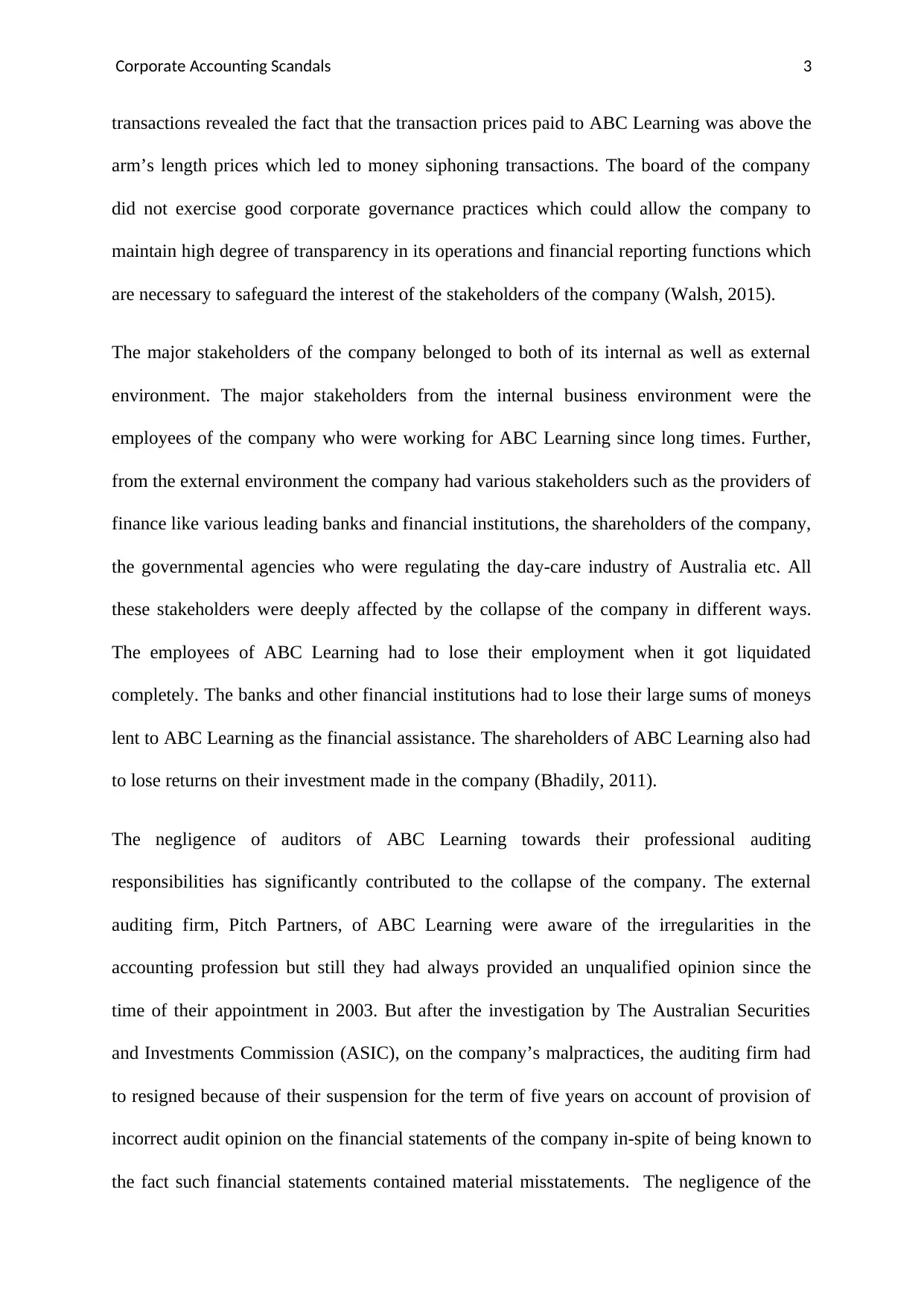
Corporate Accounting Scandals 3
transactions revealed the fact that the transaction prices paid to ABC Learning was above the
arm’s length prices which led to money siphoning transactions. The board of the company
did not exercise good corporate governance practices which could allow the company to
maintain high degree of transparency in its operations and financial reporting functions which
are necessary to safeguard the interest of the stakeholders of the company (Walsh, 2015).
The major stakeholders of the company belonged to both of its internal as well as external
environment. The major stakeholders from the internal business environment were the
employees of the company who were working for ABC Learning since long times. Further,
from the external environment the company had various stakeholders such as the providers of
finance like various leading banks and financial institutions, the shareholders of the company,
the governmental agencies who were regulating the day-care industry of Australia etc. All
these stakeholders were deeply affected by the collapse of the company in different ways.
The employees of ABC Learning had to lose their employment when it got liquidated
completely. The banks and other financial institutions had to lose their large sums of moneys
lent to ABC Learning as the financial assistance. The shareholders of ABC Learning also had
to lose returns on their investment made in the company (Bhadily, 2011).
The negligence of auditors of ABC Learning towards their professional auditing
responsibilities has significantly contributed to the collapse of the company. The external
auditing firm, Pitch Partners, of ABC Learning were aware of the irregularities in the
accounting profession but still they had always provided an unqualified opinion since the
time of their appointment in 2003. But after the investigation by The Australian Securities
and Investments Commission (ASIC), on the company’s malpractices, the auditing firm had
to resigned because of their suspension for the term of five years on account of provision of
incorrect audit opinion on the financial statements of the company in-spite of being known to
the fact such financial statements contained material misstatements. The negligence of the
transactions revealed the fact that the transaction prices paid to ABC Learning was above the
arm’s length prices which led to money siphoning transactions. The board of the company
did not exercise good corporate governance practices which could allow the company to
maintain high degree of transparency in its operations and financial reporting functions which
are necessary to safeguard the interest of the stakeholders of the company (Walsh, 2015).
The major stakeholders of the company belonged to both of its internal as well as external
environment. The major stakeholders from the internal business environment were the
employees of the company who were working for ABC Learning since long times. Further,
from the external environment the company had various stakeholders such as the providers of
finance like various leading banks and financial institutions, the shareholders of the company,
the governmental agencies who were regulating the day-care industry of Australia etc. All
these stakeholders were deeply affected by the collapse of the company in different ways.
The employees of ABC Learning had to lose their employment when it got liquidated
completely. The banks and other financial institutions had to lose their large sums of moneys
lent to ABC Learning as the financial assistance. The shareholders of ABC Learning also had
to lose returns on their investment made in the company (Bhadily, 2011).
The negligence of auditors of ABC Learning towards their professional auditing
responsibilities has significantly contributed to the collapse of the company. The external
auditing firm, Pitch Partners, of ABC Learning were aware of the irregularities in the
accounting profession but still they had always provided an unqualified opinion since the
time of their appointment in 2003. But after the investigation by The Australian Securities
and Investments Commission (ASIC), on the company’s malpractices, the auditing firm had
to resigned because of their suspension for the term of five years on account of provision of
incorrect audit opinion on the financial statements of the company in-spite of being known to
the fact such financial statements contained material misstatements. The negligence of the
Paraphrase This Document
Need a fresh take? Get an instant paraphrase of this document with our AI Paraphraser
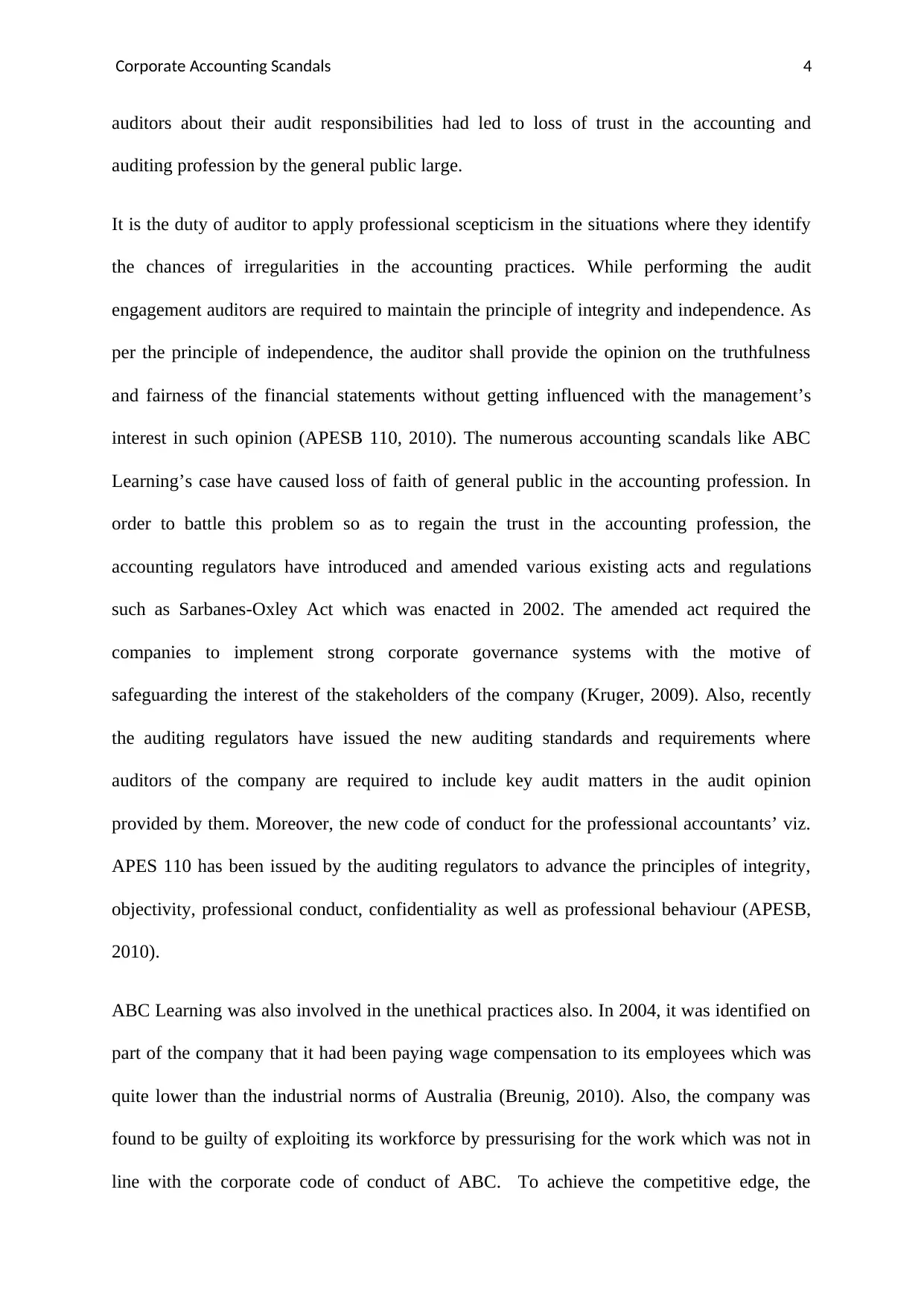
Corporate Accounting Scandals 4
auditors about their audit responsibilities had led to loss of trust in the accounting and
auditing profession by the general public large.
It is the duty of auditor to apply professional scepticism in the situations where they identify
the chances of irregularities in the accounting practices. While performing the audit
engagement auditors are required to maintain the principle of integrity and independence. As
per the principle of independence, the auditor shall provide the opinion on the truthfulness
and fairness of the financial statements without getting influenced with the management’s
interest in such opinion (APESB 110, 2010). The numerous accounting scandals like ABC
Learning’s case have caused loss of faith of general public in the accounting profession. In
order to battle this problem so as to regain the trust in the accounting profession, the
accounting regulators have introduced and amended various existing acts and regulations
such as Sarbanes-Oxley Act which was enacted in 2002. The amended act required the
companies to implement strong corporate governance systems with the motive of
safeguarding the interest of the stakeholders of the company (Kruger, 2009). Also, recently
the auditing regulators have issued the new auditing standards and requirements where
auditors of the company are required to include key audit matters in the audit opinion
provided by them. Moreover, the new code of conduct for the professional accountants’ viz.
APES 110 has been issued by the auditing regulators to advance the principles of integrity,
objectivity, professional conduct, confidentiality as well as professional behaviour (APESB,
2010).
ABC Learning was also involved in the unethical practices also. In 2004, it was identified on
part of the company that it had been paying wage compensation to its employees which was
quite lower than the industrial norms of Australia (Breunig, 2010). Also, the company was
found to be guilty of exploiting its workforce by pressurising for the work which was not in
line with the corporate code of conduct of ABC. To achieve the competitive edge, the
auditors about their audit responsibilities had led to loss of trust in the accounting and
auditing profession by the general public large.
It is the duty of auditor to apply professional scepticism in the situations where they identify
the chances of irregularities in the accounting practices. While performing the audit
engagement auditors are required to maintain the principle of integrity and independence. As
per the principle of independence, the auditor shall provide the opinion on the truthfulness
and fairness of the financial statements without getting influenced with the management’s
interest in such opinion (APESB 110, 2010). The numerous accounting scandals like ABC
Learning’s case have caused loss of faith of general public in the accounting profession. In
order to battle this problem so as to regain the trust in the accounting profession, the
accounting regulators have introduced and amended various existing acts and regulations
such as Sarbanes-Oxley Act which was enacted in 2002. The amended act required the
companies to implement strong corporate governance systems with the motive of
safeguarding the interest of the stakeholders of the company (Kruger, 2009). Also, recently
the auditing regulators have issued the new auditing standards and requirements where
auditors of the company are required to include key audit matters in the audit opinion
provided by them. Moreover, the new code of conduct for the professional accountants’ viz.
APES 110 has been issued by the auditing regulators to advance the principles of integrity,
objectivity, professional conduct, confidentiality as well as professional behaviour (APESB,
2010).
ABC Learning was also involved in the unethical practices also. In 2004, it was identified on
part of the company that it had been paying wage compensation to its employees which was
quite lower than the industrial norms of Australia (Breunig, 2010). Also, the company was
found to be guilty of exploiting its workforce by pressurising for the work which was not in
line with the corporate code of conduct of ABC. To achieve the competitive edge, the
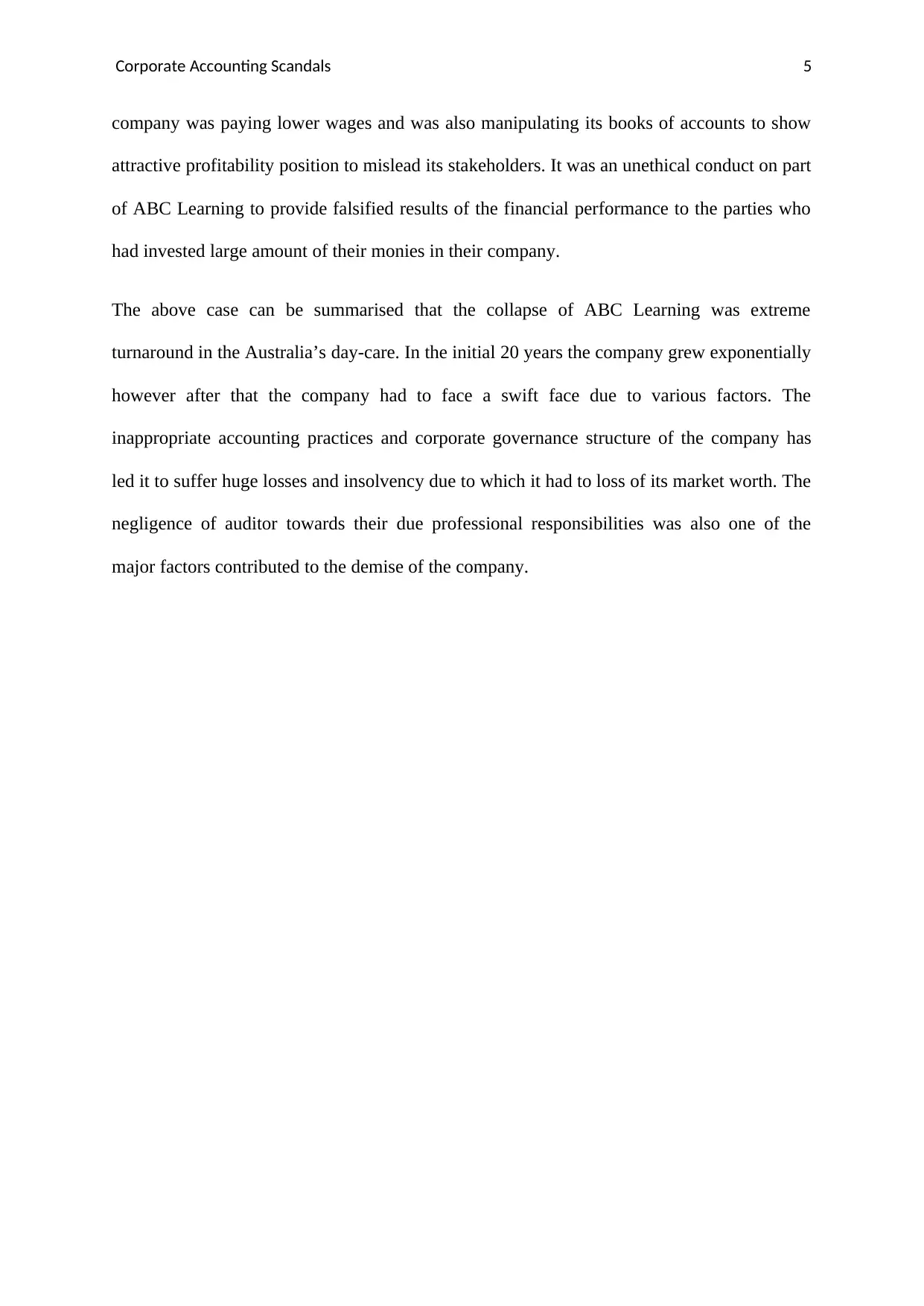
Corporate Accounting Scandals 5
company was paying lower wages and was also manipulating its books of accounts to show
attractive profitability position to mislead its stakeholders. It was an unethical conduct on part
of ABC Learning to provide falsified results of the financial performance to the parties who
had invested large amount of their monies in their company.
The above case can be summarised that the collapse of ABC Learning was extreme
turnaround in the Australia’s day-care. In the initial 20 years the company grew exponentially
however after that the company had to face a swift face due to various factors. The
inappropriate accounting practices and corporate governance structure of the company has
led it to suffer huge losses and insolvency due to which it had to loss of its market worth. The
negligence of auditor towards their due professional responsibilities was also one of the
major factors contributed to the demise of the company.
company was paying lower wages and was also manipulating its books of accounts to show
attractive profitability position to mislead its stakeholders. It was an unethical conduct on part
of ABC Learning to provide falsified results of the financial performance to the parties who
had invested large amount of their monies in their company.
The above case can be summarised that the collapse of ABC Learning was extreme
turnaround in the Australia’s day-care. In the initial 20 years the company grew exponentially
however after that the company had to face a swift face due to various factors. The
inappropriate accounting practices and corporate governance structure of the company has
led it to suffer huge losses and insolvency due to which it had to loss of its market worth. The
negligence of auditor towards their due professional responsibilities was also one of the
major factors contributed to the demise of the company.
⊘ This is a preview!⊘
Do you want full access?
Subscribe today to unlock all pages.

Trusted by 1+ million students worldwide
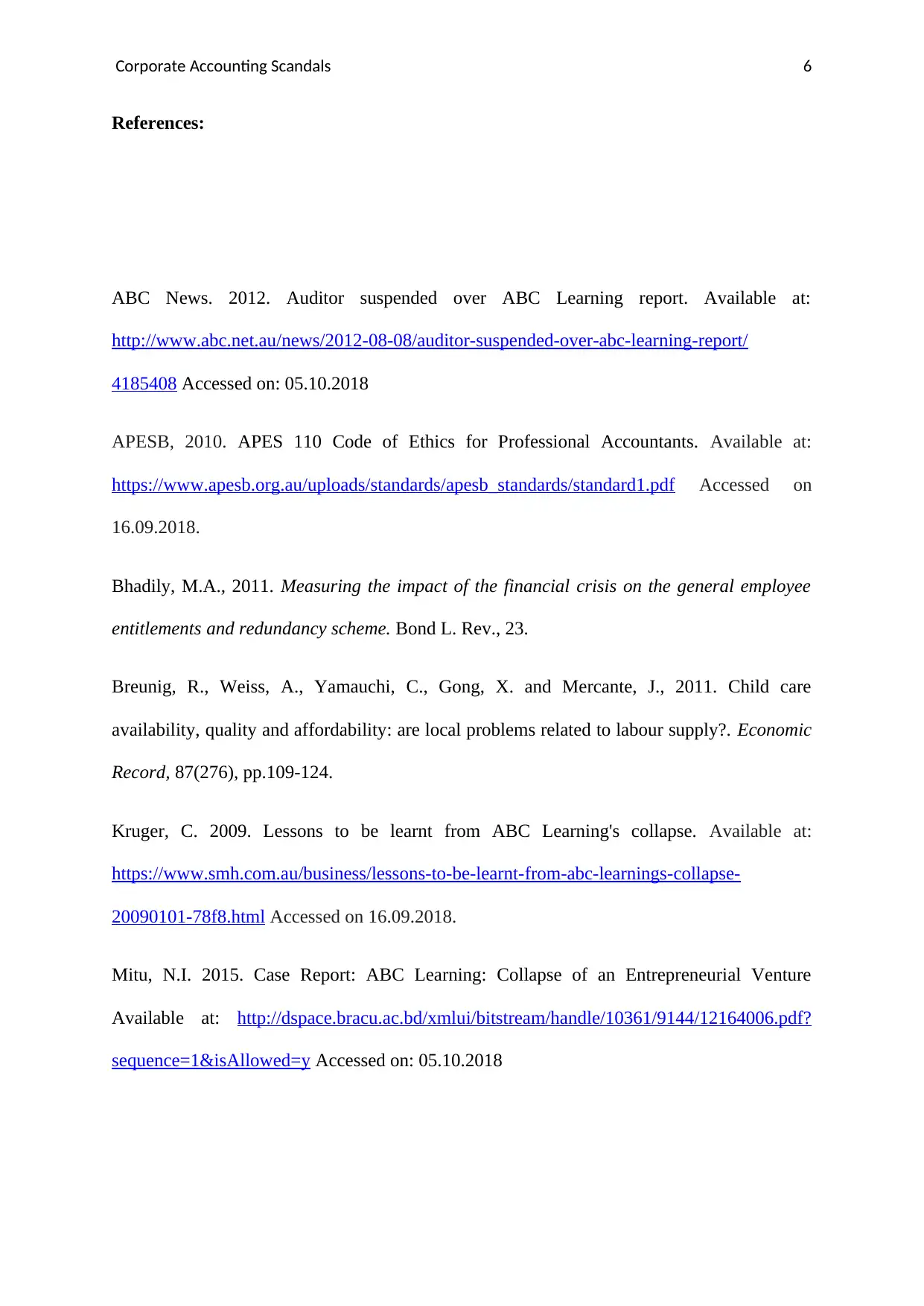
Corporate Accounting Scandals 6
References:
ABC News. 2012. Auditor suspended over ABC Learning report. Available at:
http://www.abc.net.au/news/2012-08-08/auditor-suspended-over-abc-learning-report/
4185408 Accessed on: 05.10.2018
APESB, 2010. APES 110 Code of Ethics for Professional Accountants. Available at:
https://www.apesb.org.au/uploads/standards/apesb_standards/standard1.pdf Accessed on
16.09.2018.
Bhadily, M.A., 2011. Measuring the impact of the financial crisis on the general employee
entitlements and redundancy scheme. Bond L. Rev., 23.
Breunig, R., Weiss, A., Yamauchi, C., Gong, X. and Mercante, J., 2011. Child care
availability, quality and affordability: are local problems related to labour supply?. Economic
Record, 87(276), pp.109-124.
Kruger, C. 2009. Lessons to be learnt from ABC Learning's collapse. Available at:
https://www.smh.com.au/business/lessons-to-be-learnt-from-abc-learnings-collapse-
20090101-78f8.html Accessed on 16.09.2018.
Mitu, N.I. 2015. Case Report: ABC Learning: Collapse of an Entrepreneurial Venture
Available at: http://dspace.bracu.ac.bd/xmlui/bitstream/handle/10361/9144/12164006.pdf?
sequence=1&isAllowed=y Accessed on: 05.10.2018
References:
ABC News. 2012. Auditor suspended over ABC Learning report. Available at:
http://www.abc.net.au/news/2012-08-08/auditor-suspended-over-abc-learning-report/
4185408 Accessed on: 05.10.2018
APESB, 2010. APES 110 Code of Ethics for Professional Accountants. Available at:
https://www.apesb.org.au/uploads/standards/apesb_standards/standard1.pdf Accessed on
16.09.2018.
Bhadily, M.A., 2011. Measuring the impact of the financial crisis on the general employee
entitlements and redundancy scheme. Bond L. Rev., 23.
Breunig, R., Weiss, A., Yamauchi, C., Gong, X. and Mercante, J., 2011. Child care
availability, quality and affordability: are local problems related to labour supply?. Economic
Record, 87(276), pp.109-124.
Kruger, C. 2009. Lessons to be learnt from ABC Learning's collapse. Available at:
https://www.smh.com.au/business/lessons-to-be-learnt-from-abc-learnings-collapse-
20090101-78f8.html Accessed on 16.09.2018.
Mitu, N.I. 2015. Case Report: ABC Learning: Collapse of an Entrepreneurial Venture
Available at: http://dspace.bracu.ac.bd/xmlui/bitstream/handle/10361/9144/12164006.pdf?
sequence=1&isAllowed=y Accessed on: 05.10.2018
Paraphrase This Document
Need a fresh take? Get an instant paraphrase of this document with our AI Paraphraser
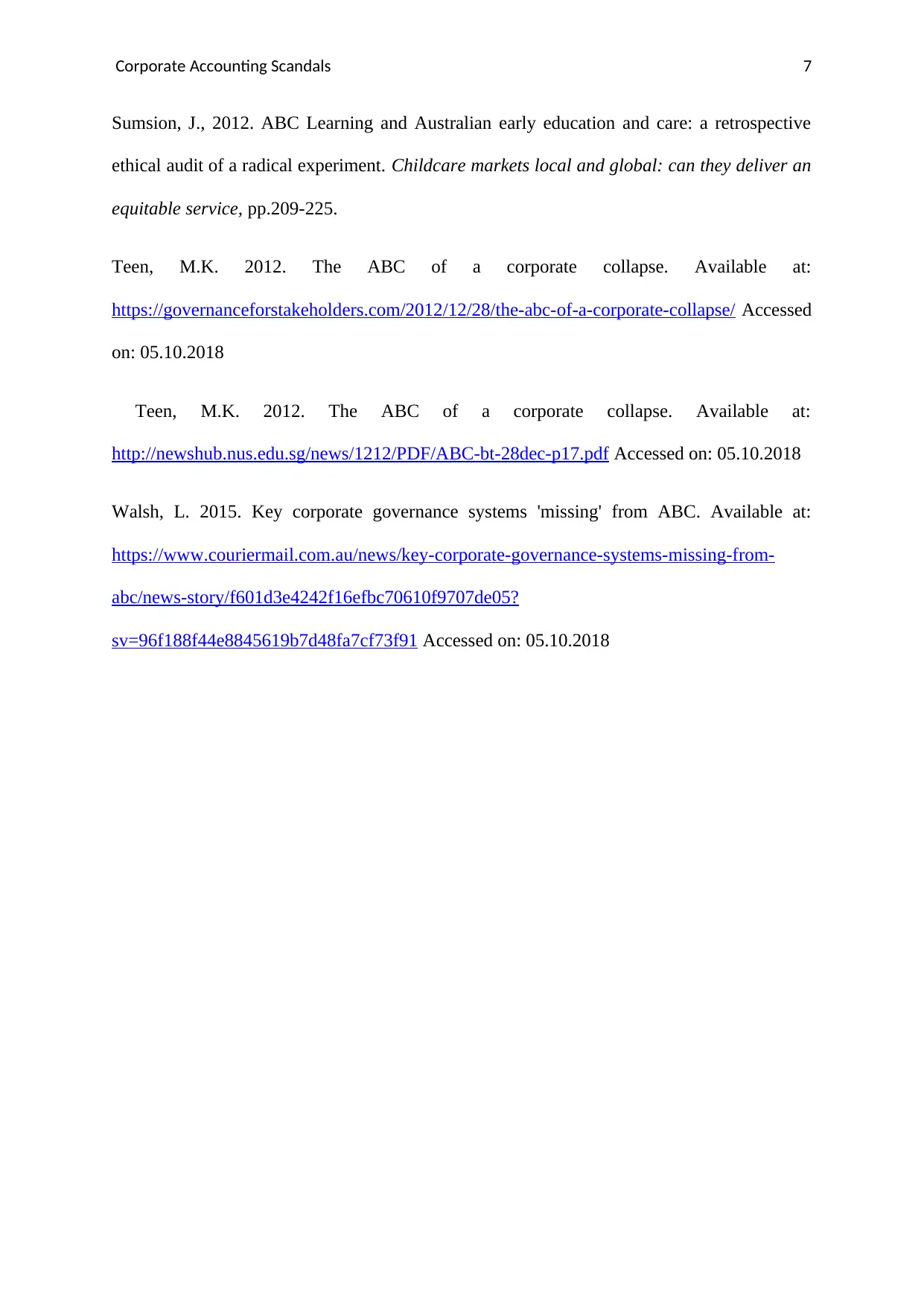
Corporate Accounting Scandals 7
Sumsion, J., 2012. ABC Learning and Australian early education and care: a retrospective
ethical audit of a radical experiment. Childcare markets local and global: can they deliver an
equitable service, pp.209-225.
Teen, M.K. 2012. The ABC of a corporate collapse. Available at:
https://governanceforstakeholders.com/2012/12/28/the-abc-of-a-corporate-collapse/ Accessed
on: 05.10.2018
Teen, M.K. 2012. The ABC of a corporate collapse. Available at:
http://newshub.nus.edu.sg/news/1212/PDF/ABC-bt-28dec-p17.pdf Accessed on: 05.10.2018
Walsh, L. 2015. Key corporate governance systems 'missing' from ABC. Available at:
https://www.couriermail.com.au/news/key-corporate-governance-systems-missing-from-
abc/news-story/f601d3e4242f16efbc70610f9707de05?
sv=96f188f44e8845619b7d48fa7cf73f91 Accessed on: 05.10.2018
Sumsion, J., 2012. ABC Learning and Australian early education and care: a retrospective
ethical audit of a radical experiment. Childcare markets local and global: can they deliver an
equitable service, pp.209-225.
Teen, M.K. 2012. The ABC of a corporate collapse. Available at:
https://governanceforstakeholders.com/2012/12/28/the-abc-of-a-corporate-collapse/ Accessed
on: 05.10.2018
Teen, M.K. 2012. The ABC of a corporate collapse. Available at:
http://newshub.nus.edu.sg/news/1212/PDF/ABC-bt-28dec-p17.pdf Accessed on: 05.10.2018
Walsh, L. 2015. Key corporate governance systems 'missing' from ABC. Available at:
https://www.couriermail.com.au/news/key-corporate-governance-systems-missing-from-
abc/news-story/f601d3e4242f16efbc70610f9707de05?
sv=96f188f44e8845619b7d48fa7cf73f91 Accessed on: 05.10.2018
1 out of 8
Related Documents
Your All-in-One AI-Powered Toolkit for Academic Success.
+13062052269
info@desklib.com
Available 24*7 on WhatsApp / Email
![[object Object]](/_next/static/media/star-bottom.7253800d.svg)
Unlock your academic potential
Copyright © 2020–2025 A2Z Services. All Rights Reserved. Developed and managed by ZUCOL.




